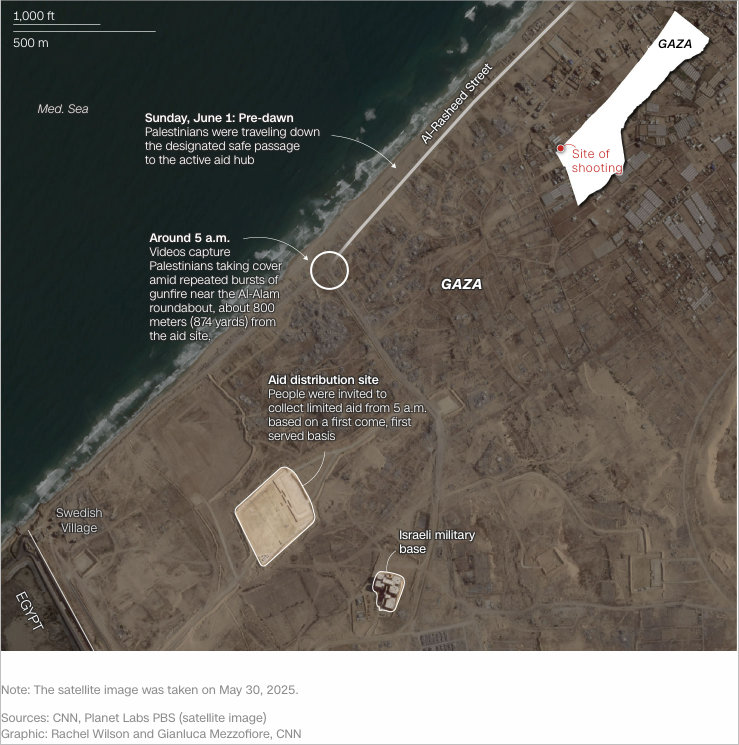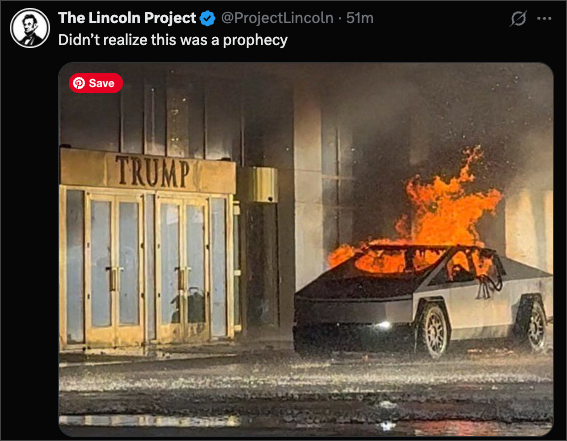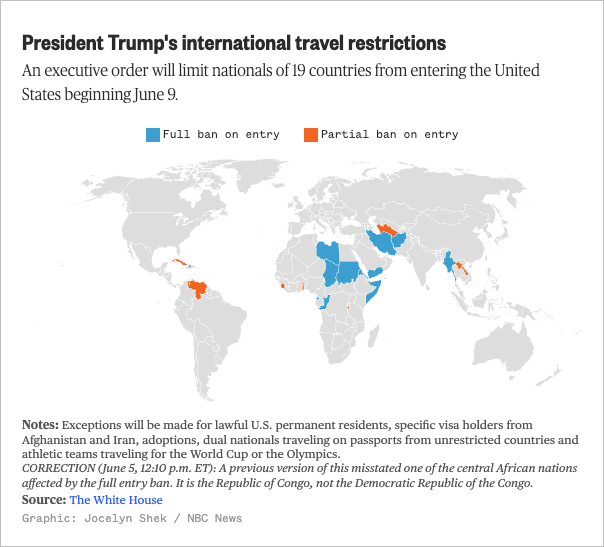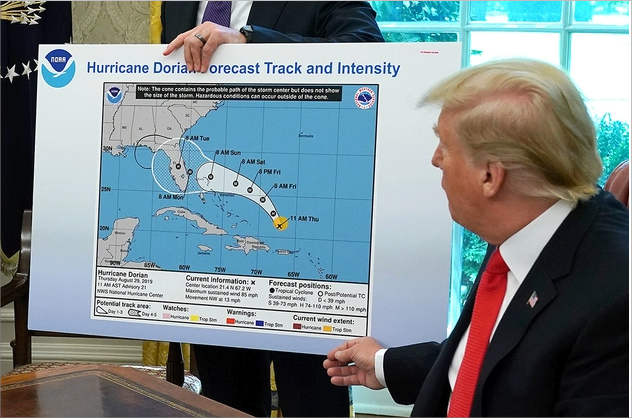Israel Gets Caught Lying, Again; Trump & Musk are Never, Ever, Ever Getting Back Together

Developing tonight: Kilmar Abrego Garcia — the Maryland man accidentally deported by the Trump Administration to a notorious prison in El Salvador — is back in the US tonight. The DOJ says he will face charges related to trafficking migrants that stem from a 2022 traffic stop in Tennessee. Abrego Garcia was pulled over for speeding with eight passengers in his car. Troopers were shown on bodycam footage discussing whether Abrego Garcia was trafficking the people, especially since they were traveling from Texas to Missouri without any luggage. Abrego Garcia was not charged at the time. His next court date is June 13.
"Asked what circumstances have changed since Abrego Garcia was not taken in custody during that traffic stop in Tennessee, [Attorney General Pam] Bondi replied, 'What has changed is Donald Trump is now president of the United States, and our borders are again secure, and thanks to the bright light that has been shined on Abrego Garcia – this investigation continued with actually amazing police work, and we were able to track this case and stop this international smuggling ring from continuing.'"

The Latest from Gaza
The Israeli military shot and killed more than 100 Palestinians and injured nearly 500 more this week as they headed to US- and Israeli-backed aid hubs to collect food after Israel’s 11-week blockade.
Despite official denials and story changes, mounting evidence—including eyewitness accounts, forensic reports, and verified videos—shows Israeli forces opened fire on unarmed civilians seeking aid. After the shootings, Israel attempted to blame Hamas and "armed gangs" for the violence.
However, mounting independent evidence continued to emerge:
- Dozens of eyewitnesses and journalists on the ground said they heard Israeli tank fire and saw military helicopters firing at the crowd
- Doctors in Gaza, interviewed by CNN, AP, and Al Jazeera, described removing M16 bullets—standard Israeli military ammunition—from victims and treating gunshot wounds to the head and chest, consistent with heavy weapon fire not typically available to Hamas. Weapons experts cited by CNN and the Associated Press confirmed that the bullet fragments and injuries matched Israeli military arms, particularly tank-mounted machine guns
- World Food Program chief Cindy McCain told ABC that her staff on the ground reported Israeli forces had fired directly on aid seekers.
- CNN and BBC geolocated videos showing Israeli forces shooting toward unarmed civilians. These videos placed the gunfire near a roundabout about half a mile from the Tel al-Sultan aid hub in Rafah, along Al-Rasheed Street—an area under Israeli military control.
- A video Israel released, claiming to show Hamas gunmen firing on the crowd, was independently geolocated by the BBC and found to have been filmed at a different location and time, unrelated to the aid distribution site. The identities of the gunmen are also disputed.
- Reports from AP, Reuters, and The Guardian revealed that some of the “armed gangs” Israel blamed for the killings had actually received financial or logistical support from Israel itself. Interviews with local leaders and Israeli opposition figures, including Yair Lapid, confirmed that Israel had backed local groups to undermine Hamas. Lapid also told the Knesset that the government secretly funneled support to GHF through shell companies.
Desperate to contain the backlash, the pro-Israel lobby responded swiftly.
- The Washington Post retracted a widely read story that had pointed to Israeli military complicity in the Gaza aid hub shootings after pressure from pro-Israel figures, including billionaire Bill Ackman. The Post stated the article “did not meet Post fairness standards,” saying it failed to give “proper weight to Israel’s denial of involvement” and presented an “incorrect level of certainty regarding any Israeli involvement in the shootings.” The revised version emphasized Israeli military claims that only “warning shots” were fired near the aid distribution site and downplayed direct attribution of civilian deaths to Israeli forces.
- At the White House, Press Secretary Karoline Leavitt told reporters there was “no evidence that Israel did anything wrong” and blamed BBC for “spreading false information,” echoing Israel’s official denials and further fueling debate over accountability and press freedom in coverage of the Gaza crisis. The BBC refuted her claims.
The GHF was created with Israeli support to replace UN-run distribution centers. Israel claimed – without evidence – that Hamas was looting aid. But the GHF model lacks basic protections: CNN reports the foundation does not screen or register aid recipients, unlike UN agencies that use ID checks to prevent theft and ensure aid reaches those in need. Eyewitnesses said criminal gangs and merchants exploited the chaos, paying people to collect aid boxes for resale.
The management consulting firm Boston Consulting Group (BCG), which had been helping GHF with logistics, abruptly withdrew from the project this week and placed a senior partner on leave. After the shootings, GHF shut down its operations, officially citing “maintenance issues,” but staff and international observers say the real cause was the violence and lack of security. More than two million Palestinians have been left without desperately needed aid. (Washington Post)
The GHF has now shut down all operations. It's unclear when or if they'll reopen. (AP)
A Bad Bromance

The once-close relationship between Donald Trump and Elon Musk imploded this week in a series of public clashes. Musk spent $250 million to help Trump win the presidencya and served as a special government advisor until May 28, when his term ended. Trump marked the occasion by gifting Musk a ceremonial “golden key” to the White House.
- Days later, in a CBS News interview, Musk aired frustrations, saying he became a “whipping boy” for Trump administration failures and that criticism of DOGE—the Department of Government Efficiency, which Musk led—was unfairly pinned on him for issues ranging from Social Security delays to tax backlogs. Musk quipped about Trump’s signature “Big Beautiful Bill,” saying, “It can be big or it can be beautiful, but I don’t know if it can be both.”
- Musk then took to X to criticize supporters of Trump’s controversial tax and spending bill, posting “shame” and warning about its economic consequences.
- Wednesday: He escalated further, posting, “Bankrupting America is not ok,” directly challenging Trump’s fiscal policies.
- Thursday: The feud turned personal. Trump claimed he had asked Musk to step down and that Musk “just went CRAZY.” Musk responded by suggesting Trump should be impeached and amplified accusations about Trump’s alleged ties to Jeffrey Epstein, speculating this was why certain files remained sealed.
- Political Fallout: Steve Bannon, Trump’s former advisor, called for Musk to be investigated and even deported, questioning his immigration status in a New York Times interview.
- Government Contracts at Risk: Trump threatened to revoke Musk’s lucrative government contracts, a move that could have major implications for Musk’s companies, including Tesla and SpaceX.
This Week, From the Executive Branch:

- Trump banned citizens from 12 countries from entering the US and issued partial bans for the nationals of seven more. The administration claims some of the countries lack proper vetting procedures and allowing their nationals entry to the US could jeopardize national security. The White House also claims that citizens from some of the countries often overstayed their visas. The banned countries include: Afghanistan, Myanmar, Chad, Republic of Congo, Equatorial Guinea, Eritrea, Haiti, Iran, Libya, Somalia, Sudan, and Yemen. Restriction have been placed on those from Burundi, Cuba, Laos, Sierra Leone, Togo, Turkmenistan and Venezuela. Ten of the 19 countries are in Africa. The ban begins on Monday, June 9. (AP | NBC News)
- Palantir, a leading data analytics firm owned by Musk-ally and billionaire Peter Thiel, has rapidly expanded its footprint in the federal government, building a massive centralized platform that integrates sensitive personal data from agencies like the IRS, Social Security, and immigration authorities. While officials say Palantir’s technology helps detect fraud and improve security, privacy advocates warn it enables unprecedented government surveillance and profiling by culling citizen data across databases — something no other company or technology has been able to do. Critics are concerned about the potential for abuse, lack of oversight, and risks to civil liberties —especially as Palantir’s tools are used in law enforcement and immigration enforcement. The government has spent $113 million on Palantir services since January and has another $795 million in pending contracts. (NYT)
- The Trump administration said it will no longer enforce a Biden-era policy that required hospitals to provide emergency abortions if necessary to stabilize a patient’s health—even in states where abortion is illegal. The original guidance, issued after the Supreme Court overturned Roe v. Wade in 2022, interpreted the Emergency Medical Treatment and Labor Act (EMTALA) to mean hospitals must perform abortions as stabilizing treatment in medical emergencies, such as ectopic pregnancies, severe pregnancy complications, or life-threatening conditions like preeclampsia.
- Despite the policy, the AP reports that women in need of emergency abortions have still been turned away from hospital emergency rooms in some states. Experts warn that rescinding the guidance increases confusion and could deter hospitals from providing necessary emergency care, especially in states with strict abortion bans. While the Trump administration says hospitals must still comply with EMTALA, it has not clarified how this applies in states that prohibit abortion. (AP)

- The new head of the Federal Emergency Management Agency (FEMA), David Richardson, apparently didn’t know there’s such a thing as “hurricane season.” There is, and it began on June 1. The administration claimed Richardson was joking but three sources tell CBS News that Richardson appeared genuinely confused in a recent meeting. (CBS News)
- The National Oceanic and Atmospheric Administration (NOAA) forecasts an “above-normal” hurricane this season, predicting 13 to 19 named storms, with 6 to 10 hurricanes and 3 to 5 major hurricanes. For comparison, the 1991–2020 average is 14 named storms and 7 hurricanes per season. Last year, there were 18 named storms and 11 hurricanes, making 2024 one of the most damaging seasons on record. Scientists attribute the increased activity to unusually warm ocean temperatures in the Caribbean and near Florida, a trend linked to climate change.Recent federal budget cuts have raised concerns about the nation’s hurricane preparedness. NOAA and the National Weather Service have experienced workforce reductions of about 10%, and funding for weather balloon launches—crucial for storm forecasting—has been scaled back. Some meteorologists warn these cuts could hamper the accuracy of hurricane forecasts, especially in vulnerable regions.
- Florida meteorologist John Morales issued a stark warning to his viewers this week that he can no longer make accurate weather predictions because of NOAA budget cuts. “We may be flying blind,” Morales said. “We may not exactly know how strong a hurricane is before it reaches the coastline.” (Michigan Live | WSJ)
- Experts warn that the Trump administration’s cuts to NOAA and FEMA, along with calls for states to take over more disaster response, could leave communities underprepared. Federal disaster aid has been critical in the past; for example, Florida relied on $5.5 billion from FEMA after Hurricane Irma in 2017 (Popular Information)
- Secretary of State Marco Rubio announced sanctions on four International Criminal Court (ICC) judges, accusing them of abusing their authority just for investigating alleged U.S. war crimes in Afghanistan and by issuing arrest warrants for Israeli Prime Minister Benjamin Netanyahu and former defense minister Yoav Gallant. The sanctions freeze any assets the judges hold in the U.S. and prohibit American companies and individuals from doing business with them.
- Rubio called the ICC’s investigations “illegitimate and baseless actions targeting America or our close ally, Israel.” The ICC condemned the sanctions as a “clear attempt to undermine the independence of an international judicial institution,” emphasizing its mandate to provide justice for victims of atrocities under the Rome Statute.
- Two of the sanctioned judges authorized the 2020 ICC inquiry into the US and Afghanistan, where the court has jurisdiction because Afghanistan is an ICC member state. The allegations are against the CIA for committing war crimes in “secret detention facilities.” The other two judges issued arrest warrants for Netanyahu and Gallant over alleged war crimes in Gaza. The U.S. and Israel do not recognize the ICC’s authority, but Afghanistan does.
- Earlier this year, the Trump administration also sanctioned ICC chief prosecutor Karim Khan — who led the cases against Netanyahu and Gallant which may have been meant to deter accountability for war crimes and could discourage witnesses from coming forward. While ICC arrest warrants are supposed to be enforced by member states, in practice, many—including U.S. allies—have not complied, which undermines the court’s authority.
- ICE agents were reportedly unaware they were expected to conduct arrests at locations like Home Depot and 7-Eleven to meet a new, sharply increased daily deportation quota. White House Deputy Chief of Staff Stephen Miller, the architect of Trump’s immigration policies, demanded agents arrest 3,000 people daily—up from the previous mandate of 1,000. Several sources said Miller berated staff and asked, “Why aren’t you at Home Depot? Why aren’t you at 7-Eleven?” (Washington Examiner)
- The US and China will resume trade talks in London on Monday, marking their first high-level meeting since May. Following their last round of negotiations, both sides announced significant tariff reductions on selected goods. (CNN)
- Talks between the U.S. and Iran over Iran’s nuclear program remain deadlocked. The U.S. has demanded a ban on Iranian uranium enrichment in exchange for easing some sanctions, but Iran insists that enrichment is a non-negotiable right necessary for electricity production. A leaked United Nations report shows Iran has increased production of near-weapons-grade enriched uranium by 50% in the last three months—still below the 90% needed for atomic weapons, but far above the 4% typically required for civilian power. (Al Jazeera)
- Director of National Intelligence Tulsi Gabbard is reportedly considering transforming the President’s Daily Briefing (PDB) into a Fox News-style video broadcast, as President Trump doesn’t like to read. Traditionally, the PDB is a text-heavy daily intelligence summary for the president, covering national security threats and developments. Since taking office in January, Trump has received the PDB just 14 times—less than once a week—far less frequently than his recent predecessors. For comparison, during the same initial period in office, President Biden received 90 PDBs, Trump himself received 55 in his first term, and President Obama received 63. (NBC News)
- Nearly 70 attorneys, law professors, and retired Florida Supreme Court justices have filed an ethics complaint with the Florida Bar against U.S. Attorney General Pam Bondi, accusing her of “serious professional misconduct.” The complaint centers on a February 5 memo in which Bondi directed Justice Department lawyers to “zealously pursue the President’s political objectives” or face disciplinary action, including possible termination. The complaint cites three examples of lawyers being fired or forced to resign after refusing to carry out what they considered unethical demands by Bondi or senior management. The DOJ dismissed the complaint as “performative” and “vexatious.” Bondi, a former Florida attorney general and current member of the Florida Bar, has been accused of politicizing her office and undermining judicial independence. (Newsweek)

- Also raising concerns: The Trump administration has appointed a 22-year-old, just one year out of college, to lead terrorism prevention at the Department of Homeland Security. Thomas Fugate, whose background is largely unknown, now heads the Center for Prevention Programs and Partnerships (CP3). Several counterterrorism experts told ProPublica they had to search LinkedIn to find any information on Fugate and were surprised to see a photo of “a college kid” with a flag pin and little to no relevant threat prevention experience listed in his employment history. (ProPublica)
- Applicants for federal government jobs—including positions such as janitors, medical workers, engineers, lawyers, and economists—will now be required to answer four questions assessing their patriotism and support for Trump’s policies. Candidates must write 200-word essays and pledge not to use AI to compose their answers. Human resources experts have criticized the move, arguing that hiring should be based on merit and skills, not subjective loyalty tests. (Axios)
- Defense Secretary Pete Hegseth has ordered the U.S. Navy to rename a ship currently named after Harvey Milk, the first openly gay elected official in U.S. history and a Navy veteran. The name change was initiated during Pride Month, a move widely seen as intentional and symbolic. (Military.com)
- The Defense Department is also considering renaming other Navy ships that bear the names of prominent civil rights figures, including Ruth Bader Ginsburg, Harriet Tubman, and Medgar Evers. (CBS News)
- The suspect in an attack on demonstrators calling on Hamas to release Israeli hostages has been charged 118 counts including a federal hate crime charge and 28 counts of attempted murder. 15 people were injured in the attack. (Axios)
- Mohamed Sabry Soliman is an Egyptian national who entered the country on a visa that has since expired. The government is now seeking to deport Soliman's entire family – including children from four to 17 years old. "There is no precedent in the history of the United States for the type of collective family-based punishment that the Trump administration is doling out on this family," the attorney, Eric Lee, told NBC’s Morgan Chesky. (NBC News)
- The standoff between Harvard and the Trump administration escalated this week. Last month, a federal judge temporarily barred an order from the Department of Homeland Security that revoked Harvard’s ability to allow international students from enrolling or attending. The order would have impacted thousands of students. At the time, the government accused Harvard of failing to do enough to curb antisemitism on campus and failing to provide requested information about foreign students.
- This week, Trump tried another way: He issued a presidential proclamation barring international students from enrolling at Harvard for the next six months. The order also directed Secretary of State Marco Rubio to consider revoking the visas of current international students at the university. In this order, Trump went a step further and accused Harvard of “extensive entanglements with foreign countries,” raising national security concerns—particularly regarding China—and claims the university is no longer a “trustworthy steward of international student and exchange visitor programs.” On Thursday, the same federal judge temporarily banned that order.
- Harvard argues the latest order is part of an ongoing retaliation campaign against the univeresity for refusing to comply with federal demands to control campus governance and academic freedom. In court filings, Harvard contends that the administration’s actions are unconstitutional and threaten the university’s mission and international reputation.
“The surveillance appears to largely be an intimidation tactic, five students who have been followed, recorded or eavesdropped on said. The undercover investigators have cursed at students, threatened them and in one case drove a car at a student who had to jump out of the way, according to student accounts and video footage shared with the Guardian… In two bizarre interactions captured by one student on video, a man who had been trailing the student faked disabilities, and noisily – and falsely – accused a student of attempting to rob him.”
Records show the university has spent $800,000 between June 2024 and September 2024 on the company they hired for the job. The University of Michigan did not deny the allegations and said no one had complained about the PIs. The University also appealed to the state’s attorney general Dana Nessel — a Democrat — to prosecute students on whom they had collected evidence. (The Guardian)
Courts
- The Supreme Court ruled 6-3 to allow the Department of Government Efficiency (DOGE) to access sensitive Social Security Administration data, including Social Security numbers, medical and mental health records, family court information, and financial details. The conservative majority temporarily lifted lower court restrictions at the Trump administration’s request, arguing DOGE needs the data to root out fraud and modernize government systems. The three liberal justices dissented, warning the decision creates “grave privacy risks for millions of Americans” and criticizing the court for granting “unfettered access” before the legality of DOGE’s access is fully reviewed by lower courts. The case now returns to the Fourth Circuit Court of Appeals for further consideration. (NPR)
- The Supreme Court unanimously rejected a lawsuit filed by the Mexican government against several U.S. gun manufacturers, including Smith & Wesson and Colt, which alleged that these companies knowingly supplied firearms to distributors who sold weapons later trafficked to Mexican drug cartels. Mexico argued that as many as 90% of guns recovered at crime scenes in Mexico originate from the United States. However, the justices ruled that the lawsuit is barred by the Protection of Lawful Commerce in Arms Act (PLCAA), a 2005 law that broadly shields gun manufacturers from liability when their products are misused by third parties, including criminals. Writing for the Court, Justice Elena Kagan explained that Congress enacted the PLCAA to halt lawsuits seeking to hold gun makers accountable for harms caused by the misuse of their products. The Court held that the gun companies could only be liable if they took additional steps beyond selling the guns to actively promote crimes. (Vox)
- The Supreme Court also unanimously ruled to lower the threshold for bringing reverse discrimination lawsuits in 20 states and the District of Columbia. Previously, those states imposed a higher bar for majority-group plaintiffs (such as white or heterosexual individuals) to sue for discrimination under federal law. Justice Ketanji Brown Jackson wrote for the Court that federal law protects all individuals equally, regardless of majority or minority status, and that Congress left no room for courts to impose special requirements on majority-group plaintiffs. The case involved an Ohio woman who sued after losing out on two jobs that were awarded to gay colleagues. (PBS)
- U.S. District Judge James Boasberg ruled that migrants deported to El Salvador’s CECOT prison under the Alien Enemies Act must be allowed to challenge their deportations. CBS News reported that three-quarters of those sent to CECOT had no criminal records. The Alien Enemies Act is a rarely used wartime law that allows the president to deport anyone deemed an enemy or combatant, but the Supreme Court has previously ruled that those deported under the act are entitled to due process. The government has one week to respond to the ruling. (NBC News)
- Four states—California, Massachusetts, New Jersey, and New York—are petitioning the Food and Drug Administration (FDA) to lift restrictions on mifepristone, one of two pills used for medication abortion, arguing that it is safe for use in primary care settings and that current regulations are unnecessarily burdensome. (NBC News)
That's that! Have a great weekend. See you next week!